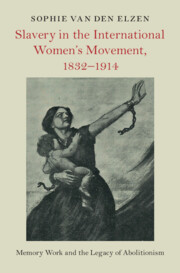Acknowledgements
Much has happened since my dissertation morphed into a book project, and I have many people to thank for their support and willingness to engage with this story. Ann Rigney is first among them. Without her intellectual curiosity, critical eye, and generosity this book would not have seen the light of day. I am also indebted to Berteke Waaldijk for lending this project her time, prudent advice, and keen attentiveness to historical silence.
I owe a debt of gratitude to the series editors of Slaveries since Emancipation, Zoe Trodd and Randall Miller, for their enthusiasm for the topic and their patience in seeing this project through. I’ve also benefitted immensely from the thoughtful and generative feedback from the anonymous readers of the initial manuscript. The editorial team at Cambridge University Press, Cecelia Cancellaro and Victoria Phillips, have been encouraging and forbearing.
I consider myself lucky to have had the company of some brilliant colleagues at Utrecht University, who have left their marks on this book in different ways. I am especially grateful to Clara Vlessing, Thomas Smits, Daniele Salerno, Tashina Blom, Duygu Erbil, Barnita Bagchi, Christian Wicke, Lida Amiri, Michela Borzaga, Flore Janssen, Frank Brandsma, and Susanne Knittel.
For their interest and judicious feedback on different parts and iterations of my argument, I am grateful to Maria Tamboukou, Astrid Erll, Red Chidgey, Mineke Bosch, Rosemarie Buikema, Maria Grever, Marijke Huisman, Kevin Absillis, Jenny Wüstenberg, Nancy Jouwe, Dineke Stam, Marianne Van Remoortel, and Karen Offen. I also benefitted from the feedback from colleagues in the doctoral programme of the Huizinga Institute, as well as the Mnemonics Network for Memory Studies and the Utrecht Forum for Memory Studies.
I’ve received sage advice and encouragement at critical junctures from Stefan Berger, Ernestine Hoegen, and Owen Holland. And, closer to home, from Lucy van den Elzen, Didi van Trijp, Anaël Tromp, Maninder Järleberg, and Eva Prakken – thank you all very much.
The helpful staff at the Atria Institute, the Bibliothèque nationale de France, the International Institute of Social History, the Friends House London, the Archiv der deutschen Frauenbewegung, and the Bibliothèque Marguerite Durand were vital to this undertaking. I’d like to thank especially Mirjam Sachse, Lisa McQuillan, and Susanne Neugebauer.
This research and publication was funded by the Dutch Research Council and has received additional support from the Feministisch Cultuurfonds Gender&wetenschap, the Utrechtse Stichting voor Literatuurwetenschappelijk Onderzoek, and the Institute of Cultural Inquiry at Utrecht University.
In 2022 we welcomed a bright little boy into our lives. Thanks, Oscar, for your good spirits and for teaching me the valuable lesson that good things in life take many hands. This book did, too. I am very grateful to Oscar’s loving grandparents, Guus, Anda, Joan, and James, for making it possible for me to finish this project, with their encouragement as well as generous hands-on support. In the final stages of this project, Gabrielle and Jacqueline unexpectedly came back into my life, adding sheen to a somewhat surreal period of time. I am thankful for that, too.
Thanks cannot begin to cut it when it comes to the contribution Eoghan made to this book. I see you on every page and know you were there, in all weathers and at any hour of the day. You are my rock and my rock ‘n’ roll, and your willingness to endlessly talk over the difficulties of this book has made for some of the sweetest memories of the last years.

